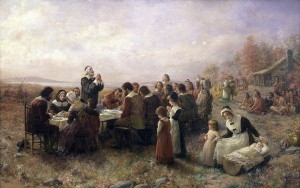
 Earlier this semester in a Great Conversation 3 class, we discussed the common assumption that the Pilgrims founded America so that everyone could worship as they please. Something of this assumed religious pluralism seems even to color how many understand the first Thanksgiving. Natives and British settlers side by side, setting aside religious and cultural differences, simply to “be thankful.”
Earlier this semester in a Great Conversation 3 class, we discussed the common assumption that the Pilgrims founded America so that everyone could worship as they please. Something of this assumed religious pluralism seems even to color how many understand the first Thanksgiving. Natives and British settlers side by side, setting aside religious and cultural differences, simply to “be thankful.”
However, when we read William Bradford’s journal, now known as Of Plymouth Plantation, we find that the Pilgrims were guided by a quite different goal – a goal deeply rooted in a robust and rugged commitment to biblical theology and biblical society. We should remember that the Pilgrims did not “found America” but a colony, and they had definite designs for that colony that are at odds with the multicultural and secularized America of today. Prior to establishing Plymouth colony, the Pilgrims spent roughly twelve years in Holland where they enjoyed something of the religious freedom that had been denied them in England. And yet Bradford tells us of the Pilgrims’ concern for the influence of the Dutch culture on their children. He writes, “But still more lamentable, and of all sorrows most heavy to be borne, was that many of the children, influenced by these conditions, and the great licentiousness of the young people of the country, and the many temptations of the city, were led by evil example into dangerous courses” (I.4). Liberty understood as autonomy was not what the Pilgrims had in mind for their community.
What did they have in mind? What would be the guiding purpose, the raison d’etre, of the Pilgrim settlement in the New World? Providing what was in effect a summary of their mission statement, Bradford writes,
Last and not least, they cherished a great hope and inward zeal of laying good foundations, or at least of making some way towards it, for the propagation and advance of the gospel of the kingdom of Christ in the remote parts of the world, even though they should be but stepping stones to others in the performance of so great a work. (I.4)
The same basic purpose is repeated in the Mayflower Compact: the planting of the first colony in northern Virginia was “for the glory of God, and the advancement of the Christian faith.” The purpose was not to “plant the seed of popular government”; nor was the purpose to create a context for religious autonomy. The purpose was for the colony, and America more broadly, to be an outright Christian society, submitted in all of its aspects to the lordship of Christ.
We should add an essential component —indeed, perhaps the key component — for grasping the basic commitment of the Pilgrims: the reality of Divine Providence. They were seeking to fulfill the Great Commission, but not merely by their own strength and willpower. They did not sever the vital connection between “making disciples of all nations” and the promise of Christ, “Lo, I am with you, even to the end of the age.” As Bradford emphasizes repeatedly, God had not only established their purpose, but He is also simultaneously present with them, moving them and upholding them toward the goal. Every aspect of their experience, every trial and every victory, was understood in the light of God’s Providence.
And so we come to the first Thanksgiving in the autumn of 1621. Edwin Winslow, one of the Pilgrims, described the event in his journal as follows:
Our harvest being gotten in, our governor sent four men on fowling, that so we might after a special manner rejoice together, after we had gathered the fruits of our labors; they four in one day killed as much fowl, as with a little help beside, served the company almost a week; at which time amongst other recreations, we exercised our arms, many of the Indians coming amongst us, and amongst the rest their greatest king Massasoit, with some ninety men, whom for three days we entertained and feasted; and they went out and killed five deer, which they brought to the Plantation and bestowed on our Governor, and upon the Captain and others. And although it be not always so plentiful, as it was this time with us, yet by the goodness of God, we are so far from want, that we often wish you partakers of our plenty.
Winslow tells us of a special gathering, a special celebration. What were they celebrating? It was not the exceedingly bountiful harvest itself (which Bradford also relates), but the exceeding goodness of God and the testimony of His goodness to the Wampanoag Indians present (which all but doubled the Pilgrim population of roughly fifty people).
They had made it across the Atlantic; they survived the first winter in which half their number died; they endured the loss of their governor during the first spring. They were a people that had seen much and endured much, and yet had everything to be thankful for. God was with them in the new land. He would not leave nor forsake them. Regardless of common Thanksgiving celebrations today, it is without doubt that on that autumn day in 1621, a group of Pilgrims gave thanks not only for what God has done, but for what He is doing and will do in Christ.
Dr. Tom Vierra teaches courses in The Great Conversation, Logic, and Rhetoric and is part of the administrative staff at WHA.